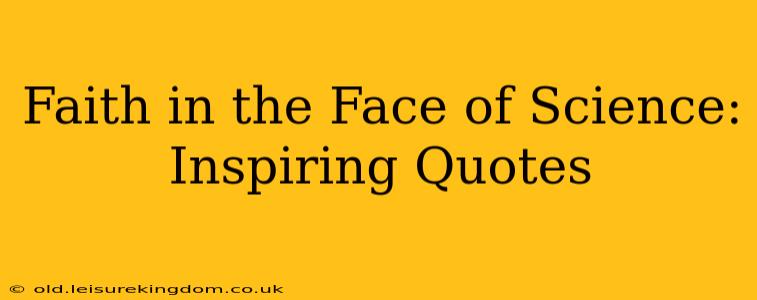The relationship between faith and science has long been a source of debate, often portrayed as a conflict rather than a potential harmony. However, many find that faith and scientific understanding can coexist, enriching each other rather than contradicting. This exploration delves into the intersection of these two powerful forces, examining how faith can inspire us even in the face of scientific advancements and discoveries. We'll explore insightful quotes that bridge this gap, offering a perspective on the compatibility of faith and reason. This isn't about resolving the debate; it's about understanding the personal journeys of those who navigate both realms with grace and understanding.
What are some quotes about faith and science?
This is a question many ponder. The quotes below, from a range of thinkers and spiritual leaders, reflect different perspectives on how faith and scientific inquiry can complement each other.
-
"The more I study science, the more I believe in God." – Louis Pasteur: This quote highlights the awe-inspiring nature of the natural world and how scientific discovery can lead to a deeper appreciation of the complexity and wonder of creation. For many, the intricate workings of the universe are a testament to a higher power.
-
"Science without religion is lame, religion without science is blind." – Albert Einstein: This famous quote beautifully encapsulates the idea that both science and religion are necessary for a complete understanding of the world. Science provides the tools to understand the how, while faith offers a framework for understanding the why.
-
"Doubt is not a pleasant condition, but certainty is absurd." – Voltaire: This quote emphasizes the importance of critical thinking and intellectual humility, even within a faith-based framework. True faith often involves grappling with uncertainties and contradictions, refining understanding rather than clinging rigidly to dogma.
How can science and faith coexist?
The perceived conflict between science and faith often arises from a misunderstanding of their respective domains. Science aims to explain the how of the universe through observation and experimentation, focusing on the natural world and its mechanisms. Faith, on the other hand, addresses the why – the purpose, meaning, and moral dimensions of existence. They are not mutually exclusive; rather, they offer different lenses through which to view the world. Many find that a scientific understanding of the universe deepens their faith by revealing the complexity and elegance of creation.
Can science disprove faith?
No, science cannot disprove faith. Science deals with empirical evidence and testable hypotheses, while faith rests on belief, spirituality, and personal experience. The two operate on different levels of inquiry and, therefore, do not directly contradict each other. Scientific advancements may challenge certain religious interpretations, prompting reevaluation and deeper understanding, but they don't inherently invalidate the core tenets of faith for many individuals.
Does faith influence scientific discoveries?
While faith doesn't directly dictate scientific methodology, it can certainly influence the motivation and values driving scientific endeavors. Many scientists are motivated by a desire to understand God's creation, viewing their work as a form of worship or a path to uncovering the wonders of the universe. The ethical considerations that guide scientific research are often shaped by faith-based values, promoting responsible innovation and minimizing harm.
How can I reconcile my faith with my scientific understanding?
Reconciling faith and science is a personal journey that often involves ongoing dialogue, reflection, and a willingness to embrace complexity. This journey might involve:
- Seeking out diverse perspectives: Engaging with theologians, scientists, and philosophers who grapple with the intersection of faith and science.
- Critical thinking and questioning: Challenging your own assumptions and biases, and being open to revising your understanding as you learn more.
- Embracing mystery: Accepting that there are aspects of the universe and human existence that may remain beyond our current comprehension.
- Finding community: Connecting with others who share similar interests and experiences in navigating the relationship between faith and science.
In conclusion, the relationship between faith and science is far more nuanced than a simple dichotomy. Many find that both offer profound insights into the world and our place within it. By embracing critical thinking, fostering intellectual humility, and seeking understanding, individuals can successfully navigate the intersection of faith and scientific discovery, enriching their lives in profound and meaningful ways.

